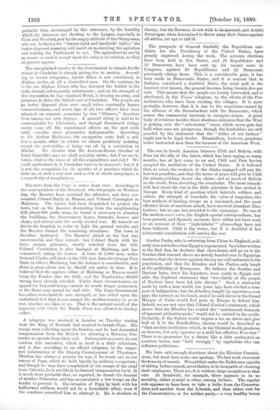Gordon Pasha, who is returning from China to England, evid-
ently does not believe that Egypt is regenerated. In a letter written in the Red Sea, he declares that slave-hunts still go on in the Soudan, that rescued slaves are merely handed over to Egyptian masters, that the decrees against slavery are still unknown to the population, and that the Khedive and his Pashas only laugh at the gullibility of Europeans. He believes the Soudan and Darfour have, since his departure, been costly to Egypt, and adds the frightful statement that "two-thirds of the people of Darfour have been led into slavery." Such a statement made by such a man would, ten years ago, have elicited a tem- pest of indignation ; but the Khedive, taught by experience, now pays the interest on his bonds, and if he sold slaves in the Grand Mosque of Cairo would find pens in Europe to defend him. Indeed, we are not sure that Colonel Gordon's statement, which shows that the Khedive has evaded the " sentimental demands of ignorant philanthropists," would not be carried to his credit. Certainly, if the Sultan would impose a tax on slaves and give half of it to the Bondholders, slavery would be described as "that ancient institution which, in the Oriental world, produces no horrors, but only operates as a mild but effective Poor-law." There is no guarantee for a throne like a debt contracted on usurious terms, and "held strongly" by capitalists who can influence politicians.


































 Previous page
Previous page